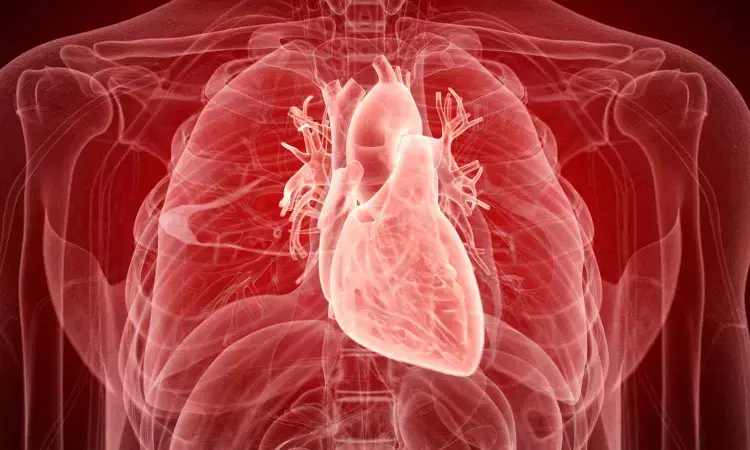- Home
- Medical news & Guidelines
- Anesthesiology
- Cardiology and CTVS
- Critical Care
- Dentistry
- Dermatology
- Diabetes and Endocrinology
- ENT
- Gastroenterology
- Medicine
- Nephrology
- Neurology
- Obstretics-Gynaecology
- Oncology
- Ophthalmology
- Orthopaedics
- Pediatrics-Neonatology
- Psychiatry
- Pulmonology
- Radiology
- Surgery
- Urology
- Laboratory Medicine
- Diet
- Nursing
- Paramedical
- Physiotherapy
- Health news
- Fact Check
- Bone Health Fact Check
- Brain Health Fact Check
- Cancer Related Fact Check
- Child Care Fact Check
- Dental and oral health fact check
- Diabetes and metabolic health fact check
- Diet and Nutrition Fact Check
- Eye and ENT Care Fact Check
- Fitness fact check
- Gut health fact check
- Heart health fact check
- Kidney health fact check
- Medical education fact check
- Men's health fact check
- Respiratory fact check
- Skin and hair care fact check
- Vaccine and Immunization fact check
- Women's health fact check
- AYUSH
- State News
- Andaman and Nicobar Islands
- Andhra Pradesh
- Arunachal Pradesh
- Assam
- Bihar
- Chandigarh
- Chattisgarh
- Dadra and Nagar Haveli
- Daman and Diu
- Delhi
- Goa
- Gujarat
- Haryana
- Himachal Pradesh
- Jammu & Kashmir
- Jharkhand
- Karnataka
- Kerala
- Ladakh
- Lakshadweep
- Madhya Pradesh
- Maharashtra
- Manipur
- Meghalaya
- Mizoram
- Nagaland
- Odisha
- Puducherry
- Punjab
- Rajasthan
- Sikkim
- Tamil Nadu
- Telangana
- Tripura
- Uttar Pradesh
- Uttrakhand
- West Bengal
- Medical Education
- Industry
Potassium nitrate fails to improve aerobic capacity or QoL in participants with HFpEF, unravels JAMA study

A new study published in the Journal of American Medical Association showed that individuals with heart failure with preserved ejection fraction (HFpEF) did not see improvements in aerobic capacity, total work, or quality of life after taking potassium nitrate.
The patients with HFpEF have been reported to have impaired nitric oxide (NO) signaling. However, there has been no improvement in exercise capacity in this state despite attempts to restore NO bioavailability by organic nitrate supplementation, phosphodiesterase type 5 inhibition, or activation of the soluble guanylate-cyclase receptor. As an alternative, supplementing with inorganic nitrate can enhance NO signaling. In this supplementary route, oral commensal bacteria absorb inorganic nitrate and then use an enterosalivary circuit to convert it to nitrite.
The patients with heart failure with maintained ejection fraction may have exercise intolerance as a result of nitric oxide insufficiency. Previous pilot investigations have demonstrated that short-term and single-dose inorganic nitrate treatment improves exercise tolerance. To evaluate the effect of long-term inorganic nitrate administration on exercise tolerance in a bigger trial of people with HFpEF, Payman Zamani and his team carried out this investigation.
From October 2016 to July 2022, participants with Northwestern University, the University of Pennsylvania, and the Philadelphia Veterans Affairs Medical Center were included in this multicenter randomized double-blind crossover study. The patients with symptomatic (NYHA class II/III) HFpEF who had objective evidence of higher left ventricular filling pressures were among the participants.
In 2024, image quantification, statistical analysis, unblinding, physiological data modeling, and biochemical tests were finished. Peak oxygen uptake and total work completed during a maximum effort incremental cardiopulmonary exercise test were the coprimary end goals. activity systemic vasodilatory reserve (i.e., the decrease in systemic vascular resistance with activity) and quality of life as measured by the Kansas City Cardiomyopathy Questionnaire were secondary endpoints.
There were a total of 84 contestants, where 58 participants (69.0%) were female, and the median age was 68 years. With a mean 6-minute walk distance of 335.5 (SD, 97.3) m, the majority of individuals (69%) had NYHA class II illness.
The KNO3 and KCl interventions were administered to 77 and 74 subjects, respectively. After 6 weeks, KNO3 raised the trough levels of metabolites of serum nitric oxide. KNO3 had no effect on total work completed or peak oxygen consumption.
Although KNO3 nitrate was well tolerated, it had no effect on quality of life or vasodilatory reserve. Overall, when compared to KCl, chronic KNO3 treatment did not enhance exercise capacity or quality of life in persons with HFpEF in this randomized crossover experiment.
Source:
Zamani, P., Shah, S. J., Cohen, J. B., Zhao, M., Yang, W., Afable, J. L., Caturla, M., Maynard, H., Pourmussa, B., Demastus, C., Mohanty, I., Miyake, M. M., Adusumalli, S., Margulies, K. B., Prenner, S. B., Poole, D. C., Wilson, N., Reddy, R., Townsend, R. R., … Chirinos, J. A. (2024). Potassium Nitrate in Heart Failure With Preserved Ejection Fraction. In JAMA Cardiology. American Medical Association (AMA). https://doi.org/10.1001/jamacardio.2024.4417
Neuroscience Masters graduate
Jacinthlyn Sylvia, a Neuroscience Master's graduate from Chennai has worked extensively in deciphering the neurobiology of cognition and motor control in aging. She also has spread-out exposure to Neurosurgery from her Bachelor’s. She is currently involved in active Neuro-Oncology research. She is an upcoming neuroscientist with a fiery passion for writing. Her news cover at Medical Dialogues feature recent discoveries and updates from the healthcare and biomedical research fields. She can be reached at editorial@medicaldialogues.in
Dr Kamal Kant Kohli-MBBS, DTCD- a chest specialist with more than 30 years of practice and a flair for writing clinical articles, Dr Kamal Kant Kohli joined Medical Dialogues as a Chief Editor of Medical News. Besides writing articles, as an editor, he proofreads and verifies all the medical content published on Medical Dialogues including those coming from journals, studies,medical conferences,guidelines etc. Email: drkohli@medicaldialogues.in. Contact no. 011-43720751


